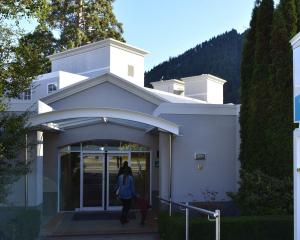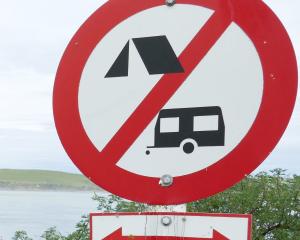Wanaka accommodation providers yesterday criticised the Queenstown Lakes District Council's proposed new visitor recovery costs scheme through changes to its rating differentials.
The visitor differential has been described in recent weeks by Mayor Vanessa van Uden and council finance manager Stewart Burns as "the next best thing to a bed tax", "not a bed tax", "not a tourist tax" and "not additional funding".
But accommodation providers remain unconvinced they will not be hit hard in the pocket when their new rates demands start arriving after July 1.
The accommodation, commercial and mixed-use sectors bear the brunt of the change, with notional cost recovery estimated between 17c and 50c per visitor a day.
Three accommodation providers described how they felt "penalised" by the changes at the council's 10-year plan hearing in Wanaka yesterday.
Taking aim first yesterday was Aspiring Campervan Park owner Richard Hutchison, who described the visitor tax as "economic extortion" at a time when "the whole world is in a financial crisis and everyone is struggling to make ends meet".
He also queried the short time frame for public submissions.
Wanaka Motel Association president Bridgit Parker, proprietor of Archway Motels, was also concerned about the communication breakdown between the council and accommodation providers, which had not given them enough time to understand the changes.
The busy sector missed the council's invitation last year to take part in the rates review, she said.
"We believe first and foremost any changes you make should financially impact on all sectors of ratepayers.
"Our members believe we are being unfairly targeted and loaded with the visitor differential," Mrs Parker said.
The motel industry was struggling with increased costs after the Christchurch earthquakes, a decline in the tourism market and increasing competition from people using their homes as undeclared businesses. Money would be better spent following up the unregulated sectors of the accommodation industry, she said.
Ms van Uden said the council actively pursued unregistered accommodation providers.
"We have spent hundreds of thousands chasing up somebody in terms of fire and safety - somebody in your town.
"We do take it very, very seriously," she said.
Mr Burns said checks on the unregistered accommodation sector last year resulted in 300 people being added to the mixed-use ratepayer category.
Ms van Uden pleaded for ratepayers to become involved in council projects much earlier.
"Saying to the media it was like the next best thing to a bed tax was about getting people involved," she admitted.
Bed and breakfast owner Sally Middleton, whose property is rated as mixed use and had 100 guest nights last year, asked the council to consider part charges.
This would reflect the fact some operators did not provide accommodation all year round.
Mrs Middleton was contemplating increasing her nightly charge by $10.35 per person to afford the new mixed-use rate, which would increase by about $361 to about $4400.
"I know there are a lot of angry people out there thinking this is a bed tax, or a pseudo bed tax ... I don't think this is right. I think the council is being a bit mean," Mrs Middleton said.












